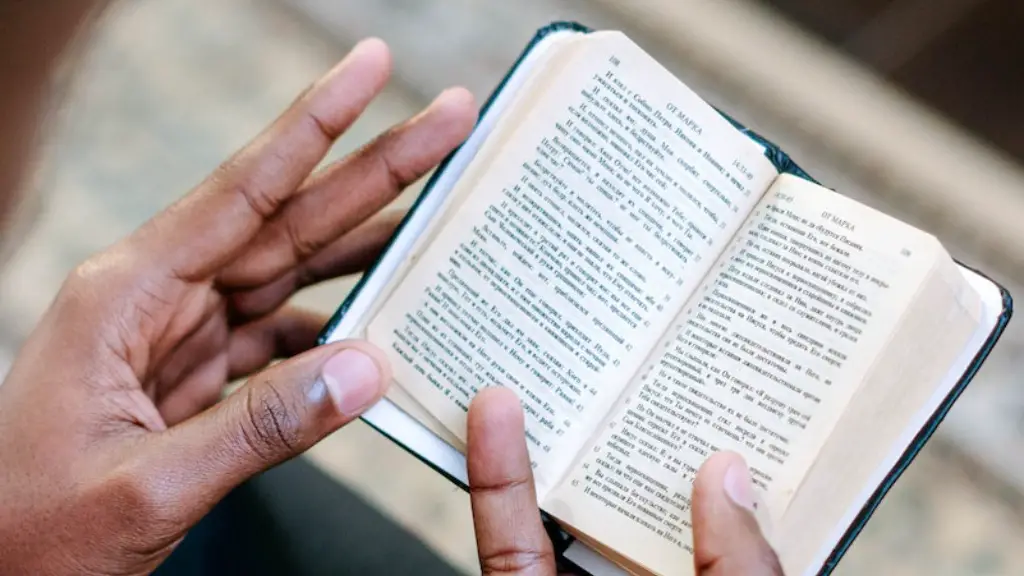Overview of the Subject
The question of how the Bible was put together has a long and complex history. Most people assume that it was the Catholic Church that put together the Bible, but this is not necessarily the case. The Catholic Church did play a role in the formation of the Bible, but it was not the only influence. In this article, the question of who put together the Bible and the importance of the Catholic Church in this process will be explored.
Compiling the Bible
When asking the question of who put together the Bible, it is important to first understand that it is not a static document. The compilation of the Bible is something that has been taking place since the very beginning. It was only later that the Catholic Church entered the picture.
The Bible itself is composed of two parts, the Old Testament and the New Testament, which were compiled from different sources. The Old Testament was largely formed from scripts that were circulating in Ancient Israel and Judah, during the time of the Babylonian Exile in the 6th century BCE. It is believed that these scriptures were compiled and edited by different Rabbis/scribes during this period.
In contrast, the New Testament is believed to have been written sometime around the 1st century CE. This collection of writings is composed of 27 different books, which were written by a variety of authors and were then compiled by the early Church. The Catholic Church played an important role in gathering and assessing the various writings that make up the New Testament, and in determining the status of certain books.
Importance of the Catholic Church
The Catholic Church was an influential factor in the formation of the Bible and it is important to understand its role in the process. The Catholic Church played a major role in gathering and assessing the various books that make up the Bible, as well as determining the status of certain books.
The Council of Trent, which took place in the mid 16th century, was an important event in the history of the Bible. This council declared the canonicity of the Bible, meaning it was the first time that the Catholic Church officially recognized the books that make up the Bible. During the council, the books that were accepted as canonical were determined and it was declared that all books outside this list were to be rejected.
The Catholic Church also played a role in the translation of the Bible. The Latin Vulgate, which remains the most commonly used text of the Bible, was translated by St. Jerome in the late fourth century CE. This translation was based on the Greek originals and was widely accepted by the Church as the official version of the Bible.
Comparing the Canon
The canon of the Bible is an interesting topic when examining the role of the Catholic Church. While the Catholic Church did have a role in determining the canon of the Bible, other non-Catholic churches have slightly different canons. For example, the Protestant churches recognize fewer books as canonical than the Catholic Churches.
The differences between the canons of the various Christian churches are largely due to their various interpretations of certain books. While all Christians accept 39 of the books of the Old Testament, some accepted a further seven, which are known as the “Deuterocanonical” books, while others accept these books only as religious writings. This distinction is at the root of the differences in the canons accepted by the different churches.
Difference in Interpretation
It is important to note that while the Catholic Church did have a role in the formation of the Bible, its role was in gathering, assessing and determining the status of certain books. The actual interpretation of these books was done by individuals and churches within the Christian tradition.
The interpretation of the Bible is something that can vary greatly and it is important to recognize that this is due to the subjective nature of the interpretation process. Different people, and different churches, can come to different conclusions about the same books and this has led to the development of various denominations within Christianity.
The Catholic Church does not have a monopoly on the interpretation of the Bible and it is important to understand that the various churches and denominations are free to come to their own conclusions about the various books. While the Catholic Church does provide an authoritative source for the interpretation of the Bible, it is not the only source.
Historical Development
The process of how the Bible was put together is an interesting one and it is important to understand the historical context of the formation process. It is clear that the Catholic Church played an important role in gathering and assessing the various books, but it was only one of many influences.
The Hebrew Bible was compiled by different Rabbis/scribes during the time of the Babylonian Exile and the New Testament was written by a variety of authors in the 1st century CE. The Council of Trent was an important event in which the Canon of the Bible was officially recognized by the Catholic Church and the Latin Vulgate translation was heavily influenced by St. Jerome in the fourth century CE.
Modern Interpretations
The question of how the Bible should be interpreted is something that has been debated for centuries and is still ongoing today. The Catholic Church does provide an authoritative source for the interpretation of the Bible, but it is important to recognize that other interpretations are possible. Most denominations today accept the Catholic Church’s interpretation, but there are still some differences in how certain books of the Bible are interpreted.
The Bible is not a static document and its interpretation continues to evolve as new insights, perspectives and scholarship become available. Each denomination is free to come to their own conclusions about the various books and this has led to a variety of interpretations.
Conclusion
The Catholic Church did have an important role in the formation of the Bible, but it was not the only influence. The Old Testament was compiled by different Rabbis/scribes during the time of the Babylonian Exile and the New Testament was written by a variety of authors in the 1st century CE. The Council of Trent played an important role in the acceptance of certain books, but the interpretation of the Bible is something that has been done by individuals and churches within the Christian tradition. Ultimately, the interpretation of the Bible is something that has been heavily debated for centuries and is still evolving today.


